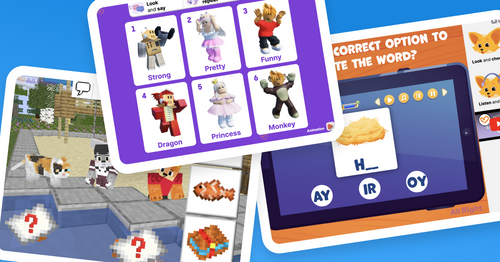Tongue twisters are an enjoyable and effective method to aid young children in their speech therapy, phonetics, and language development. Exercises that focus on pronunciation are a crucial component of children's education. These entertaining activities can boost their language skills, expand their vocabulary, and improve their word pronunciation.
Many students struggle with English pronunciation, despite being proficient in grammar and vocabulary. For those who face this challenge, tongue twisters can be a useful tool. These amusing phrases are designed to be challenging to say correctly and quickly, thus providing a fun way to practice how to pronounce words effectively.
In this article, AllRight.com will explain the reasons for this and offer some helpful tips and tricks that you can try out right away.
What are Tongue Twisters?
Tongue twisters are phrases or sentences that are difficult to say correctly because they combine similar sounds or combinations of sounds that can be tricky to pronounce. They are often used for fun or as a challenge, but they can also be useful tools for improving English pronunciation.
Benefits of Practicing Tongue Twisters
Incorporating tongue twisters into your English language learning routine can have a multitude of benefits for your pronunciation. To begin with, tongue twisters can enhance your awareness of the sound system of the English language. By rehearsing these challenging phrases, you'll be teaching your mouth the correct movement required for each sound, leading to better precision and clarity when communicating.
Furthermore, practicing tongue twisters can also boost your fluency in English. Reciting tongue twisters repeatedly and at a fast pace can help you gain confidence and fluency in your speech, making it easier to communicate effectively in various real-life scenarios.
How Tongue Twisters Work
Tongue twisters work by challenging your mouth to pronounce difficult sounds and combinations of sounds. When you practice a tongue twister, you'll be training your mouth to move in a certain way for each sound. You can use this to establish muscle memory for how each sound should be pronounced.
Additionally, by practicing tongue twisters, you'll be training your brain to recognise and differentiate between various sounds in English. This can help you improve your listening skills and your ability to recognise and reproduce correct pronunciation.
Tips for Practicing Tongue Twisters Effectively
Here are some tips for practicing tongue twisters effectively:
Start slowly: Begin by saying the tongue twister slowly and carefully, making sure you can pronounce each sound correctly.
Repeat, repeat, repeat: Practice the tongue twister repeatedly, gradually increasing your speed as you become more confident.
Record yourself: Record yourself saying the tongue twister and listen again to check for any mistakes or areas for improvement.
Focus on individual sounds: If you're struggling with a particular sound or combination of sounds, focus on practicing that part of the tongue twister until you can say it correctly.
Practice regularly: Make tongue twisters part of your regular practice routine to see the best results.
Top Tongue Twisters for Improving English Pronunciation
She sells seashells by the seashore.
How much wood would a woodchuck chuck, if a woodchuck could chuck wood?
Peter Piper picked a peck of pickled peppers.
Unique New York, Unique New York, Unique New York.
Red lorry, yellow lorry, red lorry, yellow lorry.
She sees cheese.
Zebras zig and zebras zag.
He threw three balls.
Greek grapes, Greek grapes, Greek grapes.
Lucky rabbits like to cause a ruckus.
Fred fed Ted bread and Ted fed Fred bread.
Four furious friends fought for the phone.
Spread it thick, say it quick.
Selfish Shellfish
Truly rural
Tongue Twisters for Kids - Why They Are Important
Tongue twisters are an excellent teaching tool for kids as well as for adults learning English. By working on tongue twisters, they can improve their vocabulary, memory, and other speech and language abilities as well as their ability to pronounce sounds clearly. You can get assistance at TongueTwisters.net. It has a huge collection of tongue twisters in many different languages. What is more, Pinterest can help you improve kids' pronunciation. Use the keyword "tongue twisters" on Pinterest to find a wide range of tongue twisters for kids and adults.
Common Mistakes to Avoid When Practicing Tongue Twisters
Here are some common mistakes to avoid when practicing tongue twisters:
Over speeding: It's crucial to start softly and build your speed gradually. You run the risk of making errors if you start pronouncing too quickly too soon.
Not focusing on individual sounds: If you're struggling with a particular sound or combination of sounds, make sure you focus on practicing that part of the tongue twister until you can say it correctly.
Giving up too soon: Tongue twisters can be challenging, but it's important to stick with them and practice regularly in order to see improvements.
Benefits of Practicing Tongue Twisters for Kids
Improving Word Pronunciation
Tongue twisters are an excellent way to help children improve their pronunciation skills. Pronunciation involves reciting words correctly, and some words sound exactly as they are spelled, while others do not. For example, the word "car" sounds just as it is spelled, but in the word "subtle," the letter "b" is silent. Practicing tongue twisters daily can help children learn how to pronounce words accurately. EnglishClub.com has a large collection of tongue twisters for all levels of learners.
Enhancing Vocal Clarity
Kids' tongue twisters are among the best vocal exercises for enhancing sound quality. Children improve their mouth and vocal cord muscles by practicing these twisters, which stretch and strengthen those muscles. As a result, when they talk, their voice clarity is improved.
Increasing Reading Speed
Practicing tongue twisters at a quicker pace can help children read words in sentences faster. Repeating tongue twisters continuously can help them read words effectively and build up their reading speed.
Fun and Entertaining Games
Tongue twisters for kids can be used to create fun and exciting games that help with language skills development. Simple and short tongue twisters are perfect for starters, and children can say them at a faster pace. Others can then check whether the words are pronounced correctly or not. This entertaining game can be played in schools during leisure time.
Conclusion
In conclusion, improving your English pronunciation can be a fun and effective exercise through practicing tongue twisters. There are numerous tongue twisters available online to help you learn how to pronounce words better. Allright.com, an online English school, offers useful resources for teachers to access teaching materials and engaging learning activities. Play-based learning activities like tongue twisters are not only enjoyable but also help with cognitive development and literacy skills, making them a valuable tool for early childhood education. Furthermore, practicing popular tongue twisters for kids is a great way to learn about English pronunciation.









